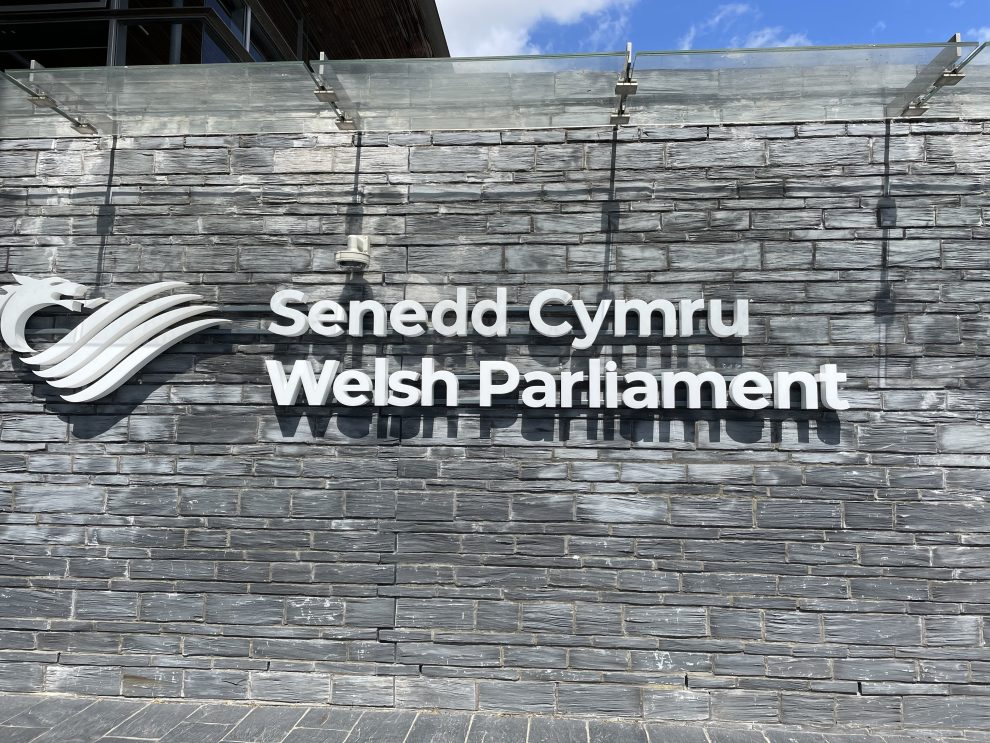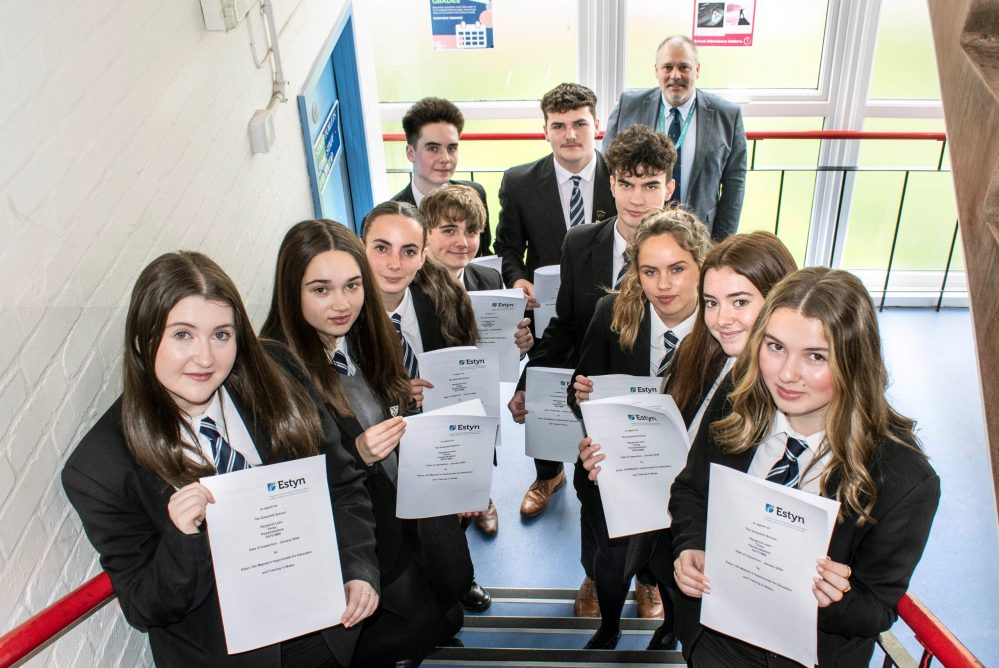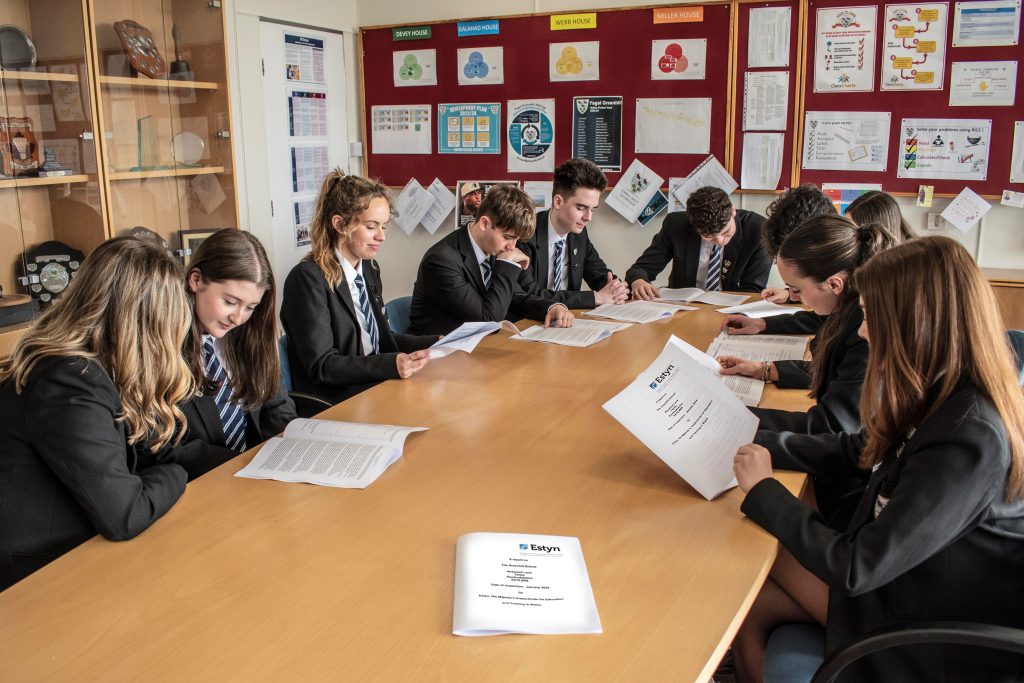Education
Becoming a teacher

TO TEACH in a Welsh state school, you must have a degree, and gain Qualified Teacher Status (QTS) by following a programme of Initial Teacher Training (ITT).
All teachers in Wales are also required to register with the Education Workforce Council (EWC).
In Wales, most training programmes are university or college-based, and you have a choice of programmes delivered in English or Welsh. QTS awarded by the Education Workforce Council in Wales is automatically recognised in England.
UCAS Teacher Training is the scheme to use to apply for the main postgraduate routes leading to QTS. If you don’t already hold a degree, you can apply via UCAS Undergraduate for teacher training programmes, to graduate with QTS.
Some more specialised teaching routes – including the Welsh Graduate Teacher Programme and Teach First – are not managed by UCAS and have a different application process. These training options offer different routes to gain QTS, depending on your professional or academic background.
Postgraduate training
University-led PGCE or PGDE
Postgraduate Certificate in Education (PGCE) and Postgraduate Diploma in Education (PGDE) training programmes are available for prospective primary and secondary school teachers. You’ll get classroom experience by spending time teaching and being trained in at least two schools, as well as time at the university or college you’ve chosen, working with a group of other students and being taught by university staff.
Typically a one year programme, students must complete a minimum of 120 days in a school, among blocks of study at their chosen training provider. Spaces on popular teacher training programmes fill up quickly. Places are allocated on a first-come, first-served basis, so apply early.
Graduate Teacher Programme
For prospective primary and secondary teachers wishing to study for their Qualified Teacher Status (QTS) in Wales, the Graduate Teacher Programme (GTP) is an employment-based route into teaching which offers a way to qualify as a teacher while you work. Programmes typically last for one year and require students to pass a newly qualified teaching year.
The GTP is very similar to School Direct (salaried) programmes in England, but is managed and delivered by the three regional teacher training centres in Wales:
- North and Mid Wales Centre for Teacher Education
- South West Wales Centre of Teacher Education
- South East Wales Centre for Teacher Education
There are a limited number of primary and secondary places available on the GTP in Wales each year. Applications are made directly to the regional teacher training centres. For more information, see Discover Teaching in Wales.
Teach First: Leadership Development Programme
This option combines leadership development and teacher training, giving applicants the chance to become an inspirational leader in classrooms that need it the most. It is a two year salaried programme leading to a Postgraduate Diploma in Education (PGDE) qualification. Following five weeks of intensive training, you’ll continue to learn on the job while you work towards QTS.
Undergraduate training
Bachelor of Education (BEd) degrees
Bachelor of Education (BEd) teacher training programmes are an undergraduate route for those who would like to follow a career in teaching, and graduate with Qualified Teacher Status (QTS). BEd programmes typically last three years, and are a popular route for prospective primary school teachers. Some providers do offer secondary-level BEd programmes for specific specialisms.
Bachelor of Arts (BA) and Bachelor of Science (BSc) with QTS
Bachelor of Arts (BA) or Bachelor of Science (BSc) degrees with Qualified Teacher Status (QTS) are popular with prospective secondary school teachers, and focus on developing specialist subject knowledge required to teach. Not a common route for those wanting to study for primary teacher training programmes, most providers only offer BA and BSc with QTS for secondary teaching.
Certificate of Higher Education (CertHE): Introduction to Secondary Teaching
This Wales-only training route is for prospective secondary teachers who may not have any formal academic qualifications, but do have a passion for maths, science, or design technology. This route gives you the chance to earn the credits needed to meet the entry requirements for BSc (Hons) degree programmes, enabling you to work towards QTS in three years.
Funding
Full-time undergraduate and postgraduate Initial ITE courses attract funding in the same way as other undergraduate degree programmes.
This means full-time students will be able to apply for student finance for fees and living costs in the same way as undergraduates on any other higher-education course.
In addition, the Welsh Government offers incentives for top graduates to train to teach in designated subjects, particularly sciences, modern languages, Welsh, and ICT.
Eligible students who are ordinarily resident in Wales and started full-time postgraduate ITE courses in the current academic year could also get a Fee Grant of up to £4,954.
Grants are also available, depending on the subject studied, for eligible ITE students undertaking full-time, pre-service PGCE PCET/FE courses.
Student teachers starting postgraduate secondary ITE courses and training through the medium of Welsh may be able to get the Welsh Medium Improvement Scheme grant. This is aimed at student teachers who need extra support to raise confidence in their ability to teach effectively in Welsh.
Student teachers on some employment-based teacher education courses will be paid a salary by their school. This will be at least equal to the minimum point on the unqualified teacher pay scale, but their school may choose to pay more.
Information on employment-based routes in Wales can be found under the ‘Employment-based routes’ section of the Teacher Education and Training in Wales website at http://bit.ly/1fFu5Ap
Students can also attend School-centred Initial Teacher Training courses in England if they have been designated to receive funding by the Welsh Government.
Education
Conservative calls for academies and free schools rejected by Senedd

THE SENEDD has rejected calls to introduce free schools and academies after a report found major challenges in Wales’ education system.
Tom Giffard led a Conservative debate on educational attainment, warning that Wales is consistently at the bottom of UK-wide league tables.
The party’s new shadow education secretary pointed to an Institute for Fiscal Studies (IFS) report on education in Wales which found low outcomes and high levels of inequality.
Mr Giffard told the Senedd the IFS report highlights the pitfalls of the Welsh Government putting all its eggs in the basket of a skills-based approach.
Criticising a failure to measure skills inequalities and pupil progress, he stressed that Wales’ lower performance is due to policy and approach rather than funding or the pandemic.
He said: “It seems the Welsh Government relies on Pisa results to tell the story but then, when those same results are all too disappointing, they are dismissed in equal measure.”
Mr Giffard, who previously worked in a primary school, said declines in Pisa results can be observed in almost every country that has adopted a skills-based approach.
Raising concerns about disappointing Pisa results, the South Wales West MS pointed out that Wales saw the lowest scores in the UK for every subject.
Heledd Fychan, Plaid Cymru’s shadow education secretary, warned that Wales’ schools are understaffed and facing difficult decisions due to budgets being at breaking point.
She criticised implementation of the Welsh Government’s additional learning needs (ALN) reforms, saying schools cannot realise the aims without the budget to bring them to life.
Ms Fychan said Plaid Cymru agreed with much of the Tory motion but her party would not support calls for free schools and academies.
Sam Rowlands described the IFS report as damning, warning that the Welsh Government’s education reforms have been disastrous and have widened inequality.
The Tory MS claimed the reforms are systematically holding back disadvantaged children, saying: “The most remarkable fact is that the performance of disadvantaged children in England is either above or similar to the average for all children in Wales.”
Mr Rowlands added: “The poorest in England’s schools are doing the same or better than the Welsh average, thanks to ambition, the academies and free schools.”
Samuel Kurtz, a fellow Tory, said free schools and academies have driven up standards in England as he argued a Wales roll-out provides an opportunity to improve outcomes.
James Evans, the Conservative MS for Brecon and Radnorshire, highlighted the party’s pledge to get 5,000 more teachers into Wales’ classrooms.
Buffy Williams, the newly elected chair of the Senedd’s education committee, said Wales is undergoing a profound transformation propelled by ALN and curriculum reforms.
The Labour MS for Rhondda stressed the importance of listening to teachers and allowing ample time for the reforms to take root in classrooms across Wales.
Altaf Hussain recounted a conversation he had this week with a headteacher at one of the largest schools in his South Wales West region.
The Conservative said: “The major improvements they have been delivering to attainment and addressing behavioural issues are all at risk because of cuts to funding.
“Vital work undertaken to improve the lives of young people with additional needs could be halted because they cannot afford to continue employing the support workers.”
Lynne Neagle recognised the scale and seriousness of work still ahead to improve Wales’ education system, stressing: “I am not, in any way, complacent about that task.”
Wales’ newly appointed education secretary, who takes over from Jeremy Miles, said sustained improvement in attainment will be among her top priorities.
She told the chamber: “My early focus has been to listen closely to schools and where it is clear that schools seek more scaffolding.”
Ms Neagle said the Welsh Government will work with trade unions and employers to reduce workload and eliminate unnecessary red tape.
The Conservative motion was voted down, 14-35, following the debate on April 24. The motion as amended by the Welsh Government was agreed, 26-23.
Education
Ysgol Greenhill welcomes positive Estyn report

YSGOL Greenhill and Pembrokeshire County Council have welcomed a strong and very positive Estyn report for the school.
Estyn, the education and training inspectorate for Wales, has released its findings following a full inspection of the school, based in Tenby, carried out in January 2024.
The report noted:
- Under the supportive leadership of the Headteacher, staff at Ysgol Greenhill work together effectively to secure a happy and respectful learning community. Together they have developed a culture of openness and collaboration and share an ambitious goal to become a self-improving school.
- Leaders have secured improvements in many important areas of the school’s work, such as pupils’ learning and attitudes and the provision of care and support for pupils’ wellbeing.
- There is a suitably coordinated approach to improving pupils’ literacy, numeracy and digital skills, including support for pupils who have weak basic skills.
- Leaders seek pupils’ views regularly on the quality and suitability of its provision and make changes accordingly. This includes amendments to pupils’ learning experiences and to the provision for developing pupils’ personal and social education.
- Teachers plan their lessons well to ensure that pupils make good progress in their learning, subject knowledge and in developing relevant literacy and numeracy skills. Teaching assistants collaborate well with teachers to ensure that pupils who require support receive beneficial assistance as they work.
- The school has a broad and valuable range of provisions to support pupils’ well-being. These include individual, tailored resource centres that provide learning, behavioural and emotional support as well as a nurture centre for pupils with low attendance. The school also hosts a local authority learning centre for pupils with autistic spectrum conditions.
- The additional learning needs team work relentlessly to ensure that pupils who access these provisions are supported purposefully to enable them to make progress in their learning and social skills.
- Pupils have positive attitudes towards school and their learning. They feel safe and value the friendly and supportive nature of staff. They settle swiftly in lessons and engage well in activities. Pupils value the ‘Ready to Learn’ system which rewards positive behaviour and provides relevant support for any pupil who displays negative behaviour.
- Sixth form pupils are strong ambassadors of the school. They are friendly and polite towards visitors, conduct themselves well and are good role models for the younger pupils. Nearly all sixth form pupils say they are well supported to make progress in their academic, personal and social development. Many benefit well from valuable opportunities to lead and influence aspects of the school’s work.
- Senior prefects run the school’s numerous pupil groups, house captains and deputy captains organise and manage house activities and trained peer mentors support younger pupils with their learning and social skills. Overall, sixth form pupils develop into mature, knowledgeable young people who speak highly of the valuable experiences they have had during their time at school.
Headteacher, David Haynes said: “I am delighted and immensely proud of this report. The school has made consistent progress over recent years and I very much look forward to Ysgol Greenhill being placed amongst the best schools in Wales.

“I must pay tribute to the outstanding staff and governors who have worked relentlessly to ensure that every pupil is valued and that their wellbeing and progress in their learning has been paramount.
“Ysgol Greenhill is a school that our pupils, families and wider community can be justifiably proud of.”
Councillor Guy Woodham, Cabinet Member for Education and Welsh Language, said: “The school has made good progress in the past two years and this is reflected in the inspection report.
“The strong and dedicated leadership of the Headteacher has contributed significantly to the inspection outcome. Alongside this the contribution of the governing body and the support from the local authority has also helped the school to achieve well. I am confident the school will continue to improve and thrive.”
Chair of the Governing Body, Mrs Heulwen Lear added: “I am thrilled that the report recognises that ‘building a supportive and positive working relationship with their pupils is a strong feature of teaching at Ysgol Greenhill’. Many pupils make secure progress in their learning and subject knowledge and understanding.
“Ysgol Greenhill’s values of kindness, respect, empathy and the celebration of diversity are reflected well in its strong commitment to pupils’ personal and social development. Staff care deeply about the well-being of their pupils and are sensitive to their individual circumstances.”
The full report is available online.
Education
Milford Haven School pupils showcase artistic talent at the Torch

FROM May 3 to May 23, the Joanna Field Gallery at the Torch Theatre, Milford Haven will be exhibiting art works by pupils from Milford Haven Comprehensive School. This will be their fourth exhibition at the Torch.
The exhibition will see 44 pupils, aged 15 to 16, who undertook GCSE Art last summer taking part. Previously, the exhibition was held at the Milford Haven Town Hall before being relocated to the Torch.
“The exhibition is a celebration of art-work created by the pupils in their final year and a chance to see what they have achieved,” explained Katie George, the Art Technician at Milford Haven Comprehensive School.

Katie added: “This will be the ninth exhibition that the school has arranged. We started off in Milford Town Hall and then were very excited to be able to show our annual art event in the Torch. This will the fourth year showing in the Torch, which has been really fantastic as it gives us a chance to show the work of the pupils in a professional setting, and the pupils have spent a great deal of time and effort completing their masterpieces under the watchful eye of their Art Teacher, Mr Chris Green. They re encouraged to use as many different materials as possible ranging from painting in watercolours and acrylics, printing, sculpture, collage, clay work, printing and many more.
“The pupils work on their individual investigations. They pick a theme of their choice and then work through with artist research that connects to their theme. They then follow with lots of experimentation using different media and materials also painting, drawing and sketching. They then have their two-day exam, which they have spent time planning for using all the skills and materials they have now become familiar with to produce a final piece that will be shown in the exhibition,” explained Katie.

“It’s always exciting to tell the pupils that their final pieces will be on show in an exhibition in The Torch and generally they are excited for that to happen. They are so busy trying out new materials and ideas during their lessons, that they don’t really think about the exhibition itself until they are invited to see their work at the Torch. When they come with their parents or friends, it’s usually a real ‘Feel Good Factor’ of achievement, which is always great to see. The whole ambiance and setting created at the Torch is perfect,” concluded Katie.
To see the exhibition by pupils from Milford Haven Comprehensive School from 3 May to 23 May at the Joanna Field Gallery, Torch Theatre visit www.torchtheatre.co.uk or call by during Box Office opening hours.
-

 News6 days ago
News6 days agoPolice issue update on the search for Luke, missing from Pembroke Dock
-

 News1 day ago
News1 day agoPolice and air ambulances at ‘serious incident’ at West Wales school
-

 News5 days ago
News5 days ago20mph U-turn: Some roads will return to 30mph following public outcry
-

 Community5 days ago
Community5 days agoMiracle pup finds her forever home after heart-wrenching journey
-

 Crime1 day ago
Crime1 day agoPembrokeshire pensioner accused of 17 sexual offences against children
-

 Crime12 hours ago
Crime12 hours agoAll three school stabbing victims discharged from hospital, police confirm
-

 Community3 days ago
Community3 days agoCounty Hall to offer space for community banking
-

 Crime3 days ago
Crime3 days agoBrian Davis: Wanted on suspicion of commercial burglary


































